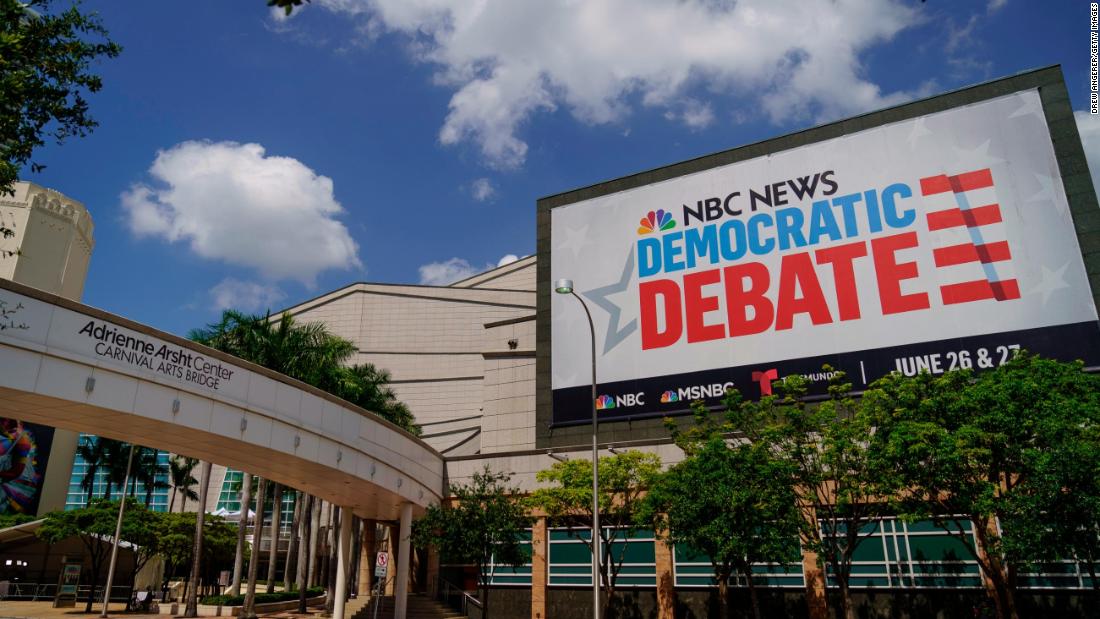[ad_1]
This is, of course, the first time we will see all the Democratic presidential candidates share the stage. Well, not all the candidates.
Steve Bullock, the governor of Montana, is being excluded from the debate. His crime? Not having enough donors or high enough poll numbers. This is a consequence of Gov. Bullock actually having a job — and doing it well.
Bullock got a Republican legislature in a Trump state to expand Medicaid. Nice work, Democratic National Committee. You’ve found a system that includes the anti-circumcision guy and the self-help guru but not the one Democratic candidate who has actually won a Trump state. And not just any Trump state. Montana, which Mr. Trump carried by more than 20 points.
I am truly undecided, like most Democrats. But any system that excludes a candidate like Bullock is messed up.
That said, debates can be clarifying events. Having prepped more politicians for more debates than I can recall, allow me to suggest a few rules to guide the Democrats during their first 2019 debate:
1. There is only one question: Who can beat Trump?
The questions may sound like they’re about health care or taxes, Iran or North Korea, but believe me, the subtext is simple: Democrats want to beat Trump, period. If you’re asked a question about the border and give an answer about the border, you’ve given an incomplete response. You must use your answer to illustrate why your position or policy makes you the best person to defeat Donald Trump.
2. Don’t say something in June of 2019 that will haunt you in November of 2020.
Funny thing about videotape — or pixels or electrons or whatever the hell this stuff is recorded on these days. It lasts. You’re like a suspect being read their Miranda rights: Anything you say can and will be used against you in November of 2020. In the words of the old civil rights song: “Keep your eyes on the prize.” This is a long race. Don’t give Mr. Trump any ammunition.
3. There is no Twitter primary.
As a close observer and an undecided voter, I have been amazed and disappointed in how assiduously many Democratic candidates are courting the overcaffeinated, overeducated, overopinionated white liberals on Twitter. You’ll never please them, and if you try to, you will only make yourself crazy — and lose. Liberate yourself from the toxic feedback loop that is Twitter.
4. People of color are the heart of the Democratic Party.
In our first strategy session with Bill Clinton, James Carville and I told him the path to the Democratic nomination would run through people of color. A lot has changed since 1992, but that observation is even more applicable today. Just as white Christian evangelicals are the heart of the GOP, people of color are the heart of the Democratic Party.
I know Iowa is, like, 138% white, but the Democratic Party is not. When you look into that camera, imagine a woman of color in Orangeburg, South Carolina. She’s working her tail off, but worries her son won’t be able to afford to go to college, especially with her daughter’s prescription drug costs going through the roof. Connect with her and you’ll connect with the needs of the majority of Americans.
5. Make news early. Your first at bat is the most important.
Viewers and voters can only process so much. As Mama used to say, “You never get a second chance to make a first impression.”
Your first answer will drive the narrative for your entire debate performance. Don’t save your best stuff for the close; it’ll be too late. In fact, there is no law that says you must simply repeat your stump speech. Why not make some news? Announce your plan on, say, lowering the cost of prescription drugs, or your ideas on expanding national service as a way to pay for higher education, or tease us with a few names of people you would consider for the Supreme Court.
Set the agenda; make your competitors respond to you.
6. Attack Trump, attack problems, but don’t attack your fellow Democrats.
I love attack politics — as long as it is fair, factual and about public issues. But even I am appalled by Donald Trump’s insult-comic act. Don’t stoop to his level.
In Iowa, especially, Democrats hate attacks. In a multicandidate field like this, it is highly likely that if Candidate A attacks Candidate B, Democrats will turn away from both A and B and suddenly Candidate C will surge. In the 2004 Iowa caucuses, Howard Dean and Dick Gephardt attacked each other. They each went from being at the head of the pack to losing to John Kerry by more than 20 points.
* * *
Finally, keep in mind that this is the alpha, not the omega, of this race. Pundits like me will likely overreact, but irrespective of whether you emerge a rising star or a fading light, keep in mind that even the best debate performance this week won’t make you president, and the worst performance won’t drive you out of the race.
[ad_2]
Source link




